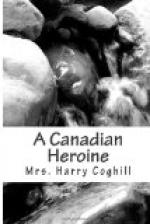CHAPTER XX.
A day or two later there came, forwarded from Paris, an English letter for Mrs. Costello. It arrived in the evening, at a time when they had no expectation of receiving anything, and Madame Everaert brought it up, and delivered it into Mrs. Costello’s own hand, so that Lucia was not near enough to see from whom it came. The general appearance of the letter made her think it was English, and she knew that Mr. Wynter had their present address and would not write to Paris. So she felt a half-joyful, half-frightened suspicion that it must be from Maurice, and her idea was confirmed by her mother’s proceedings. For Mrs. Costello having looked at the address, put the letter quietly in her pocket, and went on talking about Father Paul, from whom they were expecting a visit.
Lucia could hardly restrain herself. It was clear that Mrs. Costello did not mean to open the letter before her, or to tell her whence it came; but her anxiety to know was only increased by this certainty. She had almost made up her mind to ask plainly whether it was from Maurice, when the door opened and the old priest came in.
He was a fine-looking, white-haired man of more than seventy, to whom the long black robe seemed exactly the most suitable dress possible, and he had a good manner too, which was neither that of a mere priest, nor of a mere gentleman, but belonged to both. The first few minutes of talk made Mrs. Costello sure that she did not repent having invited his acquaintance; a fact which had been in some little doubt before.
She had said to him, “Madame Everaert told me you knew Canada, and, as we are Canadians, I could not resist the wish to see one who might still feel an interest in our country,” and this turned the conversation immediately to what she desired to hear.
He answered her with a smile, “Probably my knowledge of Canada is very different from yours; mine is almost entirely confined to the wilder and less settled parts—to the Indian lands, in fact.”
“In Upper Canada?”
“Yes. And then it is many years since I returned.”
“I have lived for twenty years in Upper Canada; and of some of the Indians, the Ojibways of Moose Island, I have heard a great deal; perhaps you know them?”
The priest’s eye brightened, but next moment he sighed.
“The very place!” he said. “Unhappy people! But I am forgetting that you, madame, are not likely to share my feelings on the subject.”
“I do not know,” Mrs. Costello answered, “that we should be wholly disagreed. I have heard, I may almost say I know myself, much of your mission there.”
“Is it possible? Can any good remain still?”
“One of your old pupils died lately, and in his last hours he remembered nothing so well as your teaching.”
Her voice shook; this sudden mention of her husband, voluntary as it was, agitated her strongly. Father Paul saw it and wondered, but appeared to see nothing.




